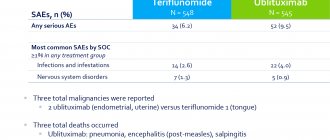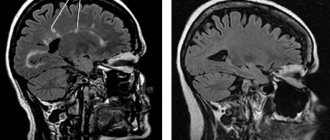The influence of bad habits on the course of the disease
Drinking strong drinks with multiple sclerosis is a rather sensitive topic. Alcohol affects the brain in any case. Alcohol abuse can cause problems with balance and coordination, which already plague a person with multiple sclerosis. In addition, alcohol has a diuretic effect, which can lead to urinary incontinence.
It is also important to remember that many medications are incompatible with alcohol. Therefore, this kind of question should be asked to your doctor. If there are no absolute contraindications, sometimes, as an exception, drinking wine in small quantities is allowed.
But smoking can definitely aggravate the course of the disease. Numerous scientific studies have shown a connection between the progression of multiple sclerosis and smoking. Therefore, it is better to completely give up nicotine.
Cerebrospinal sclerosis, disability
There are 2 types of multiple sclerosis: cerebral, when the lesion affects only the nerve fibers of the brain, and spinal, when the fibers of the spinal cord are affected. There are people whose lesions affect the spinal cord and brain.
There are several types of sclerosis. Disability depends on the type of course.
- Remitting sclerosis. It is characterized by periods of exacerbation of the disease, which are followed by remission. During remission, complete restoration of the affected organs and tissues is possible. Does not progress over time. Occurs frequently and does not lead to disability.
- Benign. It begins suddenly, with many severe attacks. The peculiarity of benign sclerosis is that the symptoms gradually weaken, and the damaged organs are given more and more time to recover. The type of disease is considered curable.
- Primary progressive. The deterioration of the condition begins with the first symptom. Quickly leads to loss of ability to work and further disability.
- Secondarily progressive. The deterioration is gradual, but within 5 years it will steadily lead to disability.
Doctor: Olga Shishkina ✓ Article checked by doctor
Causes of sclerosis
The exact reasons for the development of the disease have not yet been identified; there are assumptions about this.
Genetic factors include a specific combination of genes that cause a disorder in the body's immune system.
There are also non-genetic factors. This may be stress, unfavorable living environment, poor nutrition, bacteriological or infectious diseases, smoking, frequent injuries, exposure to radiation, ultraviolet radiation.
The cause of the development of sclerosis may be a certain combination of external and internal factors that caused this disease.
It has been proven that this is not a hereditary disease; the risk of getting sick increases if there are such patients in the family. But the transmission rate from parents to children is only 2-10%.
There are risk factors that can trigger the development of multiple sclerosis:
- A certain area of residence or insufficient production of vitamin D. More often, sclerosis affects people whose place of residence is located far from the equator. These are northern areas with insufficient sunlight. In such people, vitamin D is not produced in sufficient quantities and can cause the development of sclerosis;
- Stress, severe neuropsychic tension;
- Excessive smoking;
- Low uric acid levels;
- Received hepatitis B vaccine;
- Diseases caused by viruses or bacteria.
Popular types of diets
Many MS patients turn to a variety of dietary regimens, even though some are quite restrictive, in hopes of improving their disease. People perceive dietary nutrition as a method that can have a positive effect on the disease.
"Standard"
The purpose of the diet is to increase antioxidant activity, protect nerve cells from highly active oxygen molecules (free radicals), promote the formation of fatty acids and other substances involved in the construction of nerves, and reduce inflammatory manifestations. In MS, sufficient vitamins C, E, D, B, zinc, lecithin and the amino acid carnitine will improve lipid metabolism. A suitable dietary supplement is ginkgo biloba.
The menu of a standard diet for multiple sclerosis contains a minimum of fats of animal origin (mostly only goat's, sheep's milk, and products made from them are consumed). It is recommended to include fish in your diet at least 3 times a week. Patients suffering from MS are advised to avoid refined foods such as beet sugar, white wheat flour, and products derived from it. White wheat flour can be replaced with whole, spelled, buckwheat flour. The amount of meat is reduced, the intake of vegetables, especially dark ones, is increased.
An obligatory part of the diet menu for multiple sclerosis (preferably every day) is legumes, nuts, seeds, flaxseed oil.
It is recommended to reduce alcohol consumption and quit smoking.
Swank Diet
This diet, known for more than 60 years, is based on reducing the level of saturated fat in the diet as much as possible.
Basic Rules:
- saturated fat: <15 g per day (3 tsp);
- unsaturated fats (oils): 20-50 g per day (4-10 tsp);
- giving up red meat in the 1st year;
- after 1 year, 85 g of red meat per day is allowed;
- fat in dairy products: <1%;
- exclusion of industrially processed foods;
- taking fish oil (1 tsp or capsule equivalent) and a multivitamin every day.
The diet for multiple sclerosis, according to Dr. R. Swank, founder of the diet, may contain the following foods in any quantity:
- skim milk (including dry milk);
- low-fat cheese;
- low-fat yogurt.
Recommended consumption of dairy products is 2 servings per day (1 serving = 240 ml).
Not recommended food:
- margarine (hydrogenated);
- butter;
- salo;
- baking fat;
- Coconut oil;
- Palm oil;
- hydrogenated oil.
There is no fat in the egg white; the yolk contains 5 g. 3 eggs per week are allowed (1 egg per serving).
Beverages
Drinks allowed on the Swank diet:
- tea : 2+ cups have a positive effect on a person’s condition (emphasis on quality, avoiding drinking in the afternoon , evening);
- coffee : 6 cups per day reduces the risk of MS by 28-31%.
Sweetened drinks, lemonades, and all drinks with glucose syrup are completely excluded.
Nutrition according to Embry
Ashton Embry's diet, which he recommends following for multiple sclerosis, slightly contradicts the Swank method. It consists of excluding foods whose proteins are similar to myelin, which is damaged by the immune system.
Recommended Products:
- gluten-free cereals – buckwheat, quinoa, millet, rice, amaranth;
- white meat (poultry);
- sweeteners – honey, stevia.
The Embry Diet allows the consumption of the following foods:
- fish, seafood;
- vegetable oil;
- Rye bread;
- vegetables;
- berries;
- fruits;
- eggs.
Not recommended food:
- milk and products made from it (all, without exception);
- cereals containing gluten - barley, rye, wheat;
- legumes;
- red meat;
- beet sugar.
Also, while following the Ashton Embry diet, moderate alcohol consumption is allowed.
If you are allergic to any of the recommended foods, they should be excluded from the diet. You can replace recommended products with acceptable ones, but in reasonable quantities.
Evers nutrition
This nutritional principle was developed and published in the 1960s by Dr. J. Evers (1894-1975).
It is based on the idea that the disease has been known since industrialization. On this basis, a hypothesis was developed about the so-called. “denatured” processed food, which is the cause of the disease. There is no convincing evidence for this hypothesis. Dr. Evers designed the diet to keep every food item in its most natural state, as fresh as possible.
Patients with multiple sclerosis should avoid heat treatment of food, including cooking and baking. Also excluded:
- meat;
- alcohol;
- coffee;
- cigarettes.
The Evers diet includes:
- lots of fresh fruit;
- spring water;
- raw vegetables;
- cereals.
The need for protein is covered by fresh cheeses, fresh milk, and raw eggs.
Paleo diet
The Paleolithic (prehistoric, cave, stone age diet) diet is also recommended for patients with multiple sclerosis.
The principles of the paleo diet are based on the assertion that the diet of people living about 2 million years ago consisted of what they could catch or take from the earth. People are genetically adapted to this type of nutrition.
The Paleo diet consists of the following foods:
- all types of meat, regardless of fat content;
- vegetables;
- nuts;
- vegetable oil high in monounsaturated fatty acids;
- oils containing saturated fatty acids (coconut oil);
- eggs;
- fruits.
Bananas are not recommended.
The following should be excluded from the diet:
- cereals and their products;
- legumes;
- potatoes and starchy vegetables;
- sugar and all sweets, including honey;
- processed foods;
- margarine.
Consumption of dairy products depends on individual lactose tolerance and the risk of allergies. The strict paleo diet does not recommend dairy products. Coffee is also excluded.
By Walsh
The principle of nutrition according to T. Walsh is simple - you need to eat 9 glasses of fruits and vegetables every day. Its safety or positive results have never been clearly demonstrated by any studies.
What foods should you eat if you have multiple sclerosis?
An MS-friendly diet should help people with MS control their symptoms.
In particular, it should help control the progression of the disease and minimize the impact of common symptoms of multiple sclerosis on overall quality of life.
Here is a list of foods to include in a multiple sclerosis-friendly diet:
- Fruits and Vegetables : All fresh fruits and vegetables.
- Grains : All grains such as oats, rice, buckwheat and quinoa.
- Nuts and Seeds : All nuts and seeds.
- Fish : All fish, especially fresh and oily fish such as mackerel, herring and salmon, as they are rich in omega-3 fatty acids and vitamin D.
- Meat and Eggs : Eggs and all fresh meats such as beef, chicken, lamb, etc.
- Dairy products : milk, cheese, yogurt and butter.
- Fats : Healthy fats such as olive oil, flaxseed oil, coconut oil, and avocado oil.
- Foods rich in probiotics : yogurt, kefir, sauerkraut and kimchi.
- Drinks : water, herbal teas.
- Herbs and Spices : All fresh herbs and spices.
In short, recommendations for an MS-friendly diet are similar to eating a generally healthy, well-balanced diet. However, she emphasizes eating more plant-based foods and grains.
This is because plant foods and grains contain more fiber, vitamins, minerals and fluids, which can help with symptoms of multiple sclerosis such as constipation, fatigue and bladder dysfunction.
They also contain more plant-based compounds that act as antioxidants, molecules that help protect your cells from free radical damage and inflammation. These compounds may help fight inflammation and potentially slow the progression of multiple sclerosis (, ).
Fish, especially fatty fish such as mackerel and salmon, appears to be beneficial for MS, possibly because they are high in anti-inflammatory omega-3 fatty acids. It's also rich in vitamin D, which, when combined with calcium, can help keep your bones strong (, ,).
Current research on the effects of red meat and saturated fat consumption on MS symptoms shows mixed results. However, moderate consumption of red meat, with an emphasis on eating more fruits, vegetables and grains, is likely to be beneficial for people with MS (, ).
Dairy products also show mixed results. However, they are a good source of calcium, vitamin D, vitamin A and potassium, so you can include them in moderation in an MS-friendly diet (,).
Additionally, some research suggests that people with multiple sclerosis may have a higher risk of developing celiac disease, an autoimmune disease that causes damage to the small intestine when gluten is consumed ().
Gluten is a group of proteins found in wheat, barley and rye.
If you have multiple sclerosis and experience severe discomfort when eating gluten-based foods such as bread, pasta, cookies, and other baked goods, it is important to notify your doctor to find out if you have celiac disease.
People with multiple sclerosis who do not have celiac disease can still benefit from healthy grains in their diet.
Conclusion:
Eating plenty of fruits, vegetables, grains and fish can help manage the symptoms of multiple sclerosis. A person with multiple sclerosis may want to eat red meat and dairy products in moderation, as current research on their effects is mixed.
Body with multiple sclerosis
When a person has multiple sclerosis, the immune system attacks areas of the myelin sheath, a fatty substance essential to the functioning of the nervous system. As a result, people experience mild to severe limb damage, weakness, loss of vision and sensation, and impaired bladder and bowel function.
While a few years ago doctors believed that people with MS would inevitably need to use a wheelchair at some point in their lives, the Multiple Sclerosis Foundation says treatment options are now improving so most people with MS will not need to use a wheelchair at any point in their life.
Let's sum it up
Nutrition can be considered as an alternative way to treat chronic diseases. Unfortunately, at the moment there is no scientific evidence of the effectiveness of this or that nutritional system for multiple sclerosis.
At the same time, the above diet helps reduce blood cholesterol and increase the consumption of healthy unsaturated fatty acids. And we can definitely say that a balanced diet helps to maintain health and more effectively fight the disease.
Effectiveness of fasting
A number of neurologists and nutritionists note that in multiple sclerosis, certain positive effects from fasting are observed. However, this assumption does not have clear scientific evidence. The theory is based on the idea that during fasting the amount of toxic metabolic products in the body is reduced due to their elimination through the gastrointestinal tract and kidneys. This causes a decrease in the severity of autoimmune and inflammatory reactions.
Similar assumptions formed the basis of the diet of Sveshnikov, Nikolaev, Suvorin and other specialists. It should be noted that they were not developed for the treatment of multiple sclerosis, but were part of a healthy lifestyle program. Most doctors have a negative attitude towards fasting, since there have been no clinical studies of its effectiveness. It is believed that with a prolonged absence of food consumption, catabolic processes develop in the body, characterized by the destruction of its own proteins and fats. This can further worsen multiple sclerosis.
Dietary recommendations
Regardless of the specific diet, doctors provide general nutritional recommendations for people suffering from multiple sclerosis. They include the following items:
- The amount of calories consumed should correspond to energy expenditure. This helps prevent the development of obesity, which worsens the prognosis for the underlying pathology.
- The amount of salt should be limited. Scientific research shows that high sodium chloride intake is associated with additional lymphocyte activation. These cells are the main damaging agent to the myelin of nerve fibers.
- Protein consumption is limited to 40-60 grams. Protein molecules entering the digestive tract can be a source of sensitization to the immune system. An increase in its sensitivity to proteins explains the increase in the inflammatory response in the structures of the central nervous system.
- Meat should not be included in the diet more than 2 times a week. This is related to the previous point.
- Meals should be fractional - up to 6 times a day. Small portions improve digestion processes and ensure complete breakdown and absorption of nutrients.
- Patients are recommended to drink 2 liters of water per day, in addition to tea, coffee and natural juices.
- You should completely avoid processed foods and fast food. They contain high amounts of saturated fat and have low nutritional value.
Following these recommendations for changing your diet ensures a general improvement in the condition and functioning of the gastrointestinal tract. Foods rich in vitamins and minerals with low protein content reduce the rate of progression of multiple sclerosis.
Speaking about what kind of diet is needed for multiple sclerosis, doctors note that it depends on the individual patient. There are several types of nutritional therapy: the ketogenic diet, the paleo diet, the Swank diet and the Ashton Embry diet, each of which can improve the prognosis for the patient. As a rule, doctors, together with nutritionists, try different nutritional options, choosing the most optimal one for the patient.








